 Web Front-end
Web Front-end
 JS Tutorial
JS Tutorial
 A detailed introduction to 10 CSS and JavaScript tools for optimizing code
A detailed introduction to 10 CSS and JavaScript tools for optimizing code
A detailed introduction to 10 CSS and JavaScript tools for optimizing code
It is a very important process to inspect and test your code to find any potential errors and eliminate them before putting them on the website. The process of code inspection is also commonly known as linting between Web designers and developers. As a designer, if you want to write highly optimized code, then you must need linting tools. There are two types of code inspection tools. One is to check the code for errors and bugs at execution time. The other is to use static code analysis techniques and inspect the code before execution. The latter is obviously better because it saves time and trouble.
In fact, linting can be placed at different stages. If you like to test your code as you type it, you can use the lint tool. Of course, if you want to lint the code while saving the file or during execution, then the linting tool can also do what you want. It depends on personal choice. If you are looking for the best linting tools for CSS and JavaScript, then read on.
1.CSSLint
It is true that CSSLint will "hurt your feelings", but in exchange it will "make your code improve a lot". CSSLint currently leads the CSS linting market. It is written in JavaScript, is open source, and comes with a lot of configuration options.
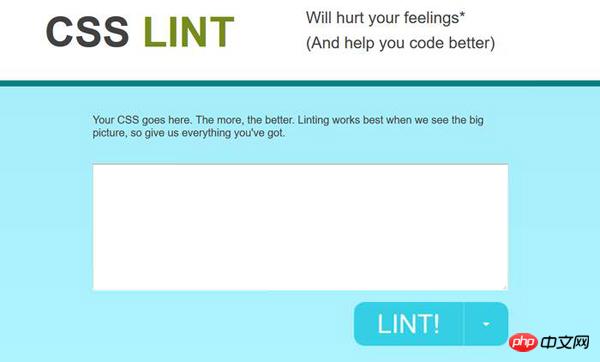
2.SublimeLinter CSSLint
CSSLint is such an efficient CSS linting tool that it is difficult to find a competitor that can match it. Perhaps this is why the SublimeLinter linting framework builds its CSS linting plugin on top of CSSLint. SublimeLinter is a SublimeText plug-in that provides users with the means to lint code (CSS, PHP, Python, Java, Ruby, etc.).
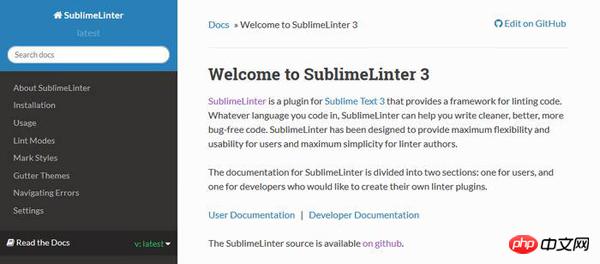
3.StyleLint
StyleLint can help developers avoid syntax errors in CSS, SCSS, or anything else PostCSS can parse. StyleLint tests over a hundred rules, and you can select which ones you want to switch (see this example configuration).
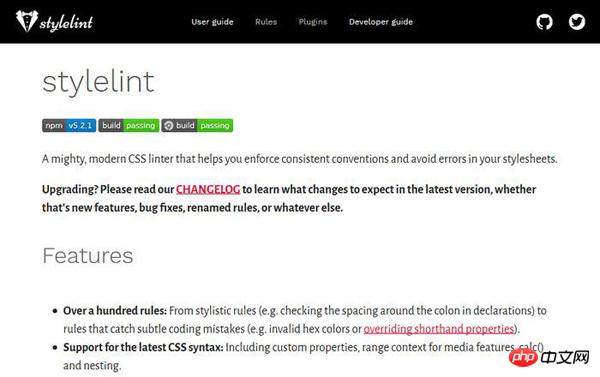
4.W3C CSS Validator
Although W3C’s CSS Validator is not generally considered a linting tool, it provides developers with a A great opportunity to check your CSS code with the official W3C standards. The W3C established its own verification program, aiming to provide a tool similar to the Lint program checker for the C language.
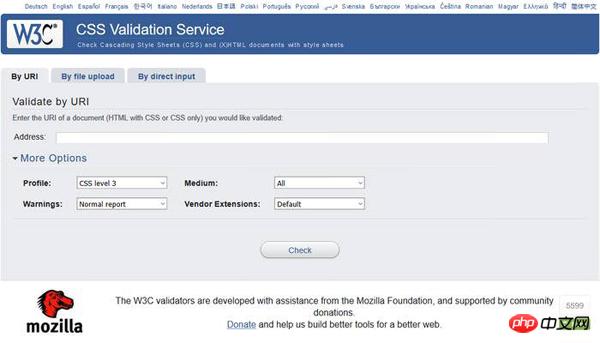
5.Dirty Markup
Dirty Markup can clean, format and validate your HTML, CSS and JavaScript code. If you like simple and straightforward design and want a quick solution, then this is the right choice. Dirty Markup can throw error messages and notifications in real time as you write or modify code in the editor.
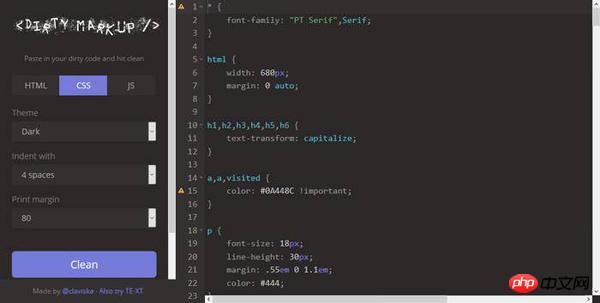
6.JSLint
JSLint was originally released in 2002 by Douglas Crockford and has flourished ever since, so you can safely It is considered a stable and reliable JavaScript linting tool.
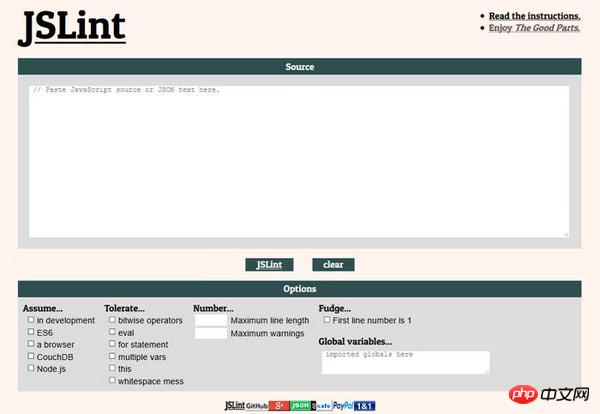
7.JSHint
JSHint is a community-driven project that began as an effort to create a more configurable, less opinionated version of JSLint. JSHint allows developers to configure any of its linting options and then put the custom configuration into a separate file. This makes the tool easy to reuse and therefore ideal for large projects.
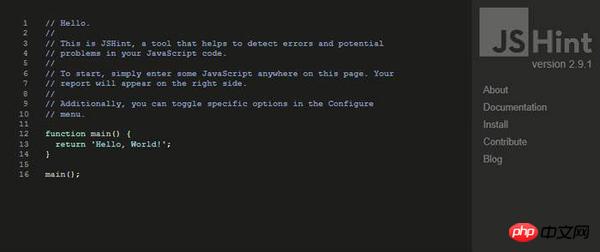
8.ESLint
ESLint is the latest big thing in the JavaScript linting landscape. The reason for its popularity is its highly flexible nature. Not only can you customize a large number of cutting-edge linting rules and integrate it with all major code editors, but you can also easily extend its functionality by adding different plugins.

9.JSCS
JSCS, or JavaScript Code Style, is a pluggable code style linter for JavaScript, used to check code format rules. The goal of JSCS is to provide a means to programmatically implement compliance with a coding style guide. Although JSCS does not check for bugs and errors, it is still used by many high-tech industry players such as Google, AirBnB, and AngularJS because it helps developers maintain a highly readable and consistent code base.
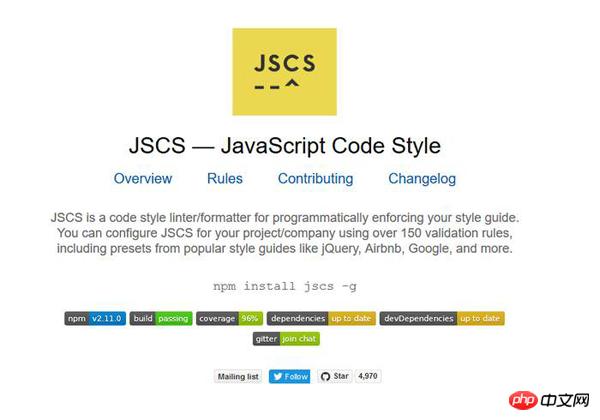
10.StandardJS
StandardJS, or JavaScript Standard Style is a code style linter, a bit like JSCS, but the difference is that it is simpler and more direct. If you don't want to spend time on configuration and just want an efficient tool that can be used out of the box, then StandardJS is a great choice.
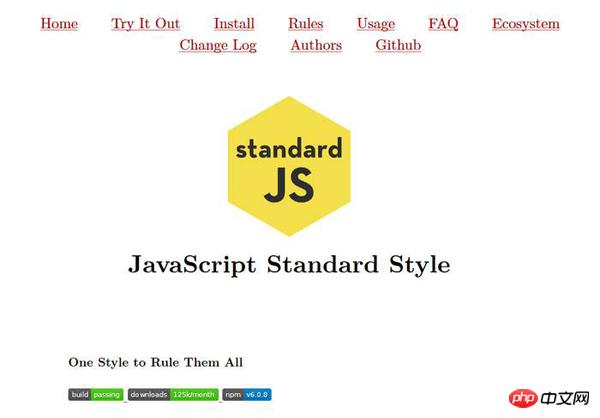
The above is a detailed introduction to the 10 CSS and JavaScript tools for optimizing code. For more related content, please pay attention to the PHP Chinese website (www.php.cn)!

Hot AI Tools

Undresser.AI Undress
AI-powered app for creating realistic nude photos

AI Clothes Remover
Online AI tool for removing clothes from photos.

Undress AI Tool
Undress images for free

Clothoff.io
AI clothes remover

Video Face Swap
Swap faces in any video effortlessly with our completely free AI face swap tool!

Hot Article

Hot Tools

Notepad++7.3.1
Easy-to-use and free code editor

SublimeText3 Chinese version
Chinese version, very easy to use

Zend Studio 13.0.1
Powerful PHP integrated development environment

Dreamweaver CS6
Visual web development tools

SublimeText3 Mac version
God-level code editing software (SublimeText3)

Hot Topics
 1652
1652
 14
14
 1413
1413
 52
52
 1304
1304
 25
25
 1251
1251
 29
29
 1224
1224
 24
24
 How to use bootstrap in vue
Apr 07, 2025 pm 11:33 PM
How to use bootstrap in vue
Apr 07, 2025 pm 11:33 PM
Using Bootstrap in Vue.js is divided into five steps: Install Bootstrap. Import Bootstrap in main.js. Use the Bootstrap component directly in the template. Optional: Custom style. Optional: Use plug-ins.
 The Roles of HTML, CSS, and JavaScript: Core Responsibilities
Apr 08, 2025 pm 07:05 PM
The Roles of HTML, CSS, and JavaScript: Core Responsibilities
Apr 08, 2025 pm 07:05 PM
HTML defines the web structure, CSS is responsible for style and layout, and JavaScript gives dynamic interaction. The three perform their duties in web development and jointly build a colorful website.
 Understanding HTML, CSS, and JavaScript: A Beginner's Guide
Apr 12, 2025 am 12:02 AM
Understanding HTML, CSS, and JavaScript: A Beginner's Guide
Apr 12, 2025 am 12:02 AM
WebdevelopmentreliesonHTML,CSS,andJavaScript:1)HTMLstructurescontent,2)CSSstylesit,and3)JavaScriptaddsinteractivity,formingthebasisofmodernwebexperiences.
 How to insert pictures on bootstrap
Apr 07, 2025 pm 03:30 PM
How to insert pictures on bootstrap
Apr 07, 2025 pm 03:30 PM
There are several ways to insert images in Bootstrap: insert images directly, using the HTML img tag. With the Bootstrap image component, you can provide responsive images and more styles. Set the image size, use the img-fluid class to make the image adaptable. Set the border, using the img-bordered class. Set the rounded corners and use the img-rounded class. Set the shadow, use the shadow class. Resize and position the image, using CSS style. Using the background image, use the background-image CSS property.
 How to write split lines on bootstrap
Apr 07, 2025 pm 03:12 PM
How to write split lines on bootstrap
Apr 07, 2025 pm 03:12 PM
There are two ways to create a Bootstrap split line: using the tag, which creates a horizontal split line. Use the CSS border property to create custom style split lines.
 How to set up the framework for bootstrap
Apr 07, 2025 pm 03:27 PM
How to set up the framework for bootstrap
Apr 07, 2025 pm 03:27 PM
To set up the Bootstrap framework, you need to follow these steps: 1. Reference the Bootstrap file via CDN; 2. Download and host the file on your own server; 3. Include the Bootstrap file in HTML; 4. Compile Sass/Less as needed; 5. Import a custom file (optional). Once setup is complete, you can use Bootstrap's grid systems, components, and styles to create responsive websites and applications.
 How to use bootstrap button
Apr 07, 2025 pm 03:09 PM
How to use bootstrap button
Apr 07, 2025 pm 03:09 PM
How to use the Bootstrap button? Introduce Bootstrap CSS to create button elements and add Bootstrap button class to add button text
 How to resize bootstrap
Apr 07, 2025 pm 03:18 PM
How to resize bootstrap
Apr 07, 2025 pm 03:18 PM
To adjust the size of elements in Bootstrap, you can use the dimension class, which includes: adjusting width: .col-, .w-, .mw-adjust height: .h-, .min-h-, .max-h-



